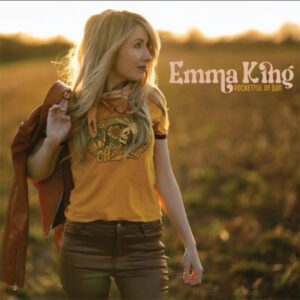
by Amity Hereweard
Emma King’s ascent from the modest streets of Hull, East Yorkshire, to the storied stages of Nashville reads like a modern‑day odyssey for anyone who believes that authenticity can bridge oceans. From the moment she first absorbed the vinyl‑crackling harmonies of Fleetwood Mac and the raw swagger of Elvis in her parents’ living room, a distinctive Americana timbre began to take shape—one that feels simultaneously rooted in British sensibility and steeped in the dust‑kissed lore of the American South. That paradox, her petite frame housing a voice that commands the space of a seasoned honky‑tonk crooner, has become the hallmark of her sound, instantly recognizable to anyone who’s ever tuned into a Nashville‑based radio wave.
By the time Emma was a teenager, she had already logged more than three hundred gigs, each one a stepping stone toward the mythic figures she idolized on late‑night television: Johnny Cash, Willie Nelson, and the legion of storytellers who defined rock ’n’ roll’s heartland. A scholarship at the Brighton Institute of Modern Music, awarded by Carleen Anderson, a direct lineage to James Brown, propelled her into a new phase of artistic rigor. It was there that Emma King and The Heartsets coalesced, a collective of bright‑eyed Brighton musicians who embraced a country‑tinged Americana aesthetic while retaining a distinctly British accent. Their self‑funded pilgrimages to Nashville were more than a promotional stunt; they were a declaration that transatlantic collaboration could thrive in a genre traditionally guarded by regional loyalty.
The five‑year saga that followed reads like a case study in strategic career building for any emerging artist. Touring the Midwest in marathon 21‑hour drives, Emma recorded at the hallowed halls of Sun Studios in Memphis—an experience that undoubtedly infused her vocal phrasing with the same reverence for legacy that the studio’s walls demand. Regular appearances at Nashville’s Bluebird Café cemented her reputation as a songwriter capable of intimate storytelling, while her presence on WSM Radio placed her alongside the very voices that once defined the Grand Ole Opry. Moreover, her collaborations with multi‑award‑winning producers such as Chas Sandford and Milan Bogdan illustrate a keen eye for partnership: she leveraged their expertise to blend classic country instrumentation with contemporary pop‑rock sensibilities, resulting in a sound that enduring and alluring on her album, Pocketful of Sun.
“Pocketful of Sun” epitomizes Emma’s ability to translate personal narrative into universal resonance. Inspired by her autistic daughter Eloise, the track employs the sunflower to anchor its lyrical optimism. The infectious hook, “I’ve got a pocketful of sun… I’ve got enough for everyone,” rides on a foundation of catchy guitar riffs and Americana licks, showcasing Emma’s knack for crafting sing‑along choruses. The song’s production balances polished studio sheen with organic instrumentation, allowing her warm vocal timbre to soar over a backdrop of organ swells and steady backbeats. This juxtaposition of heartfelt storytelling and radio‑ready arrangement makes the track a balance of authenticity and commercial appeal.
Pocketful of Sun has a twelve‑track arc that further demonstrates Emma’s versatility. “18 Hours” has a modern country beat and a sonic palette rich with textures, electric guitar flourishes, and a vocal delivery that climbs effortlessly into higher registers. “Better Than It Was” builds with King’s large range to a vocal climax that underscores her singing and the songwriting. “Rolling Like Thunder” and “Guess It Was Ours” weave Americana backbeats with tasteful guitar work, preserving a grounded country tone in King’s alluring singing. The closing number, “Helium,” adopts a relaxed groove, integrating horns, strings, and lush background vocals. King’s willingness to experiment with without losing the core of her country identity makes the album flow with variety.
King’s journey offers several entertaining takeaways. First, her commitment to live performance, supporting acts ranging from Jo Dee Messina to The Drifters, highlights the importance of stagecraft in building a loyal fanbase. Second, her strategic use of cross‑Atlantic collaborations illustrates how blending diverse musical lineages can yield a sound that is appealing to a wide audience. Finally, the meticulous attention to production details, whether it’s the 60s rock shuffle underpinning “Sweetest Song” or the intricate acoustic arrangements on “Arrows,” shows a deep respect for songcraft.
Emma King’s debut, Pocketful of Sun, is a collection of songs with narratives that weaves personal triumph, cultural exchange, and artistic integrity into a cohesive whole. King maintains her country roots while expanding the sonic vocabulary allowing her to capture authentic emotion within polished frameworks. King’s work is a compelling experience that resonates across continents, reminding us that great country music, at its heart, remains a story told with sincerity, regardless of where the storyteller calls home.


